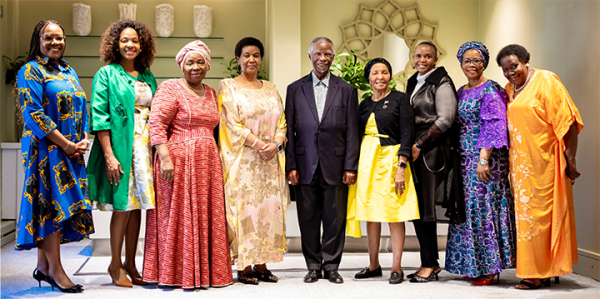

On 8 March 2025, the Thabo Mbeki Foundation (TMF), Unisa and the Women Development Bank Trust hosted International Women’s Day under the theme "Accelerate Action". The event highlighted the need for the financial inclusion for women in townships and rural areas, driving action and awareness. It also marked 30 years since the Beijing Declaration, reinforcing the urgency of gender equality and financial empowerment.

From left: Tsakani Maluleke (Auditor-General of South Africa), Zipporah Maubane (AUDA-NEPAD), Dr Nkosazana Dlamini-Zuma (former Chairperson of the African Union Commission), Dr Phumzile Mlambo-Ngcuka (former Executive Director of UN Women), former President Dr Thabo Mbeki (Chancellor of Unisa and Patron of the TMF), Zanele Mbeki (TMF Trustee), Zodwa Manase (TMF Board Member), Prof Puleng LenkaBula (Unisa Principal and Vice-Chancellor) and Modiegi Kumalo
In her message as chairperson of the TMF, Dr Geraldine Fraser-Moleketi, highlighted that 2025 is a significant year in the geo-political landscape, marking the 30th anniversary of the Beijing Declaration. She noted that while some progress has been made in gender equality over the past three decades, it remains uneven. She emphasised that this day is a foundation for women’s dialogue. She stressed that financial inclusion is key for women’s empowerment and called for more funding to accelerate gender equality, warning that at the current pace, progress will take until 2094. She urged honest conversations and ongoing seminars to drive real change.
In her welcoming remarks, Prof Puleng LenkaBula, Unisa Principal and Vice-Chancellor, highlighted the university’s commitment to women’s empowerment, noting that over 70% of its students are women. She praised Ma Mbeki’s role in mentoring and creating opportunities for women. She urged women to take responsibility for shaping their own futures. Her remarks encouraged drawing inspiration from Ma Mbeki’s legacy.
Dr Mlambo-Ngcuka, former UN Women Executive Director, reflected on the evolution of the Beijing Conference since 1995 and its role in advancing gender equality. She noted that Beijing 2020 highlighted gender-based violence and financial inclusion as critical issues. She emphasised that legal frameworks exist but remain uneven due to discriminatory laws. She questioned what intentional actions will be taken for Beijing 2030 to address ongoing challenges. She warned of the collapse of ecosystems that support women, calling for urgent action and asked the question: "What are we going to do to Beijing 2030 with intentional measures that attack women?"
Tsakane Maluleke, Auditor-General of South Africa, delivered the keynote address, challenging the audience to reflect on the volatile environment and lack of celebration for women. She warned that cruelty is more prevalent than sympathy and that the nation is regressing on the gains made for women and children. Maluleke questioned how women’s empowerment can progress if the status quo remains unchanged. She reminded the audience that while the Beijing Conference laid the foundation for gender equality, laws and policies must be effectively implemented. Maluleke stressed that women and men must enjoy full economic rights to enable women to make informed financial decisions. She called for strong institutions, ethical leadership and accountability to ensure that gender policies are implemented as intended.
The "Breaking Barriers: Strategies to Accelerate Financial Inclusion" panel emphasised the need for a mind shift, structural change and practical solutions to advance women's economic empowerment. Dr Nkosazana Dlamini-Zuma, former African Union Commission Chair, highlighted implementation failures, urging Africa to decolonise its mindset, achieve economic self-reliance and accelerate the African Continental Free Trade Area (AfCFTA). Zipporah Maubane of AUDA-NEPAD stressed the need for policy alignment and partnerships to support women entrepreneurs and combat gender-based violence, highlighting programmes like SIFA and an AI platform for women-led NGOs. Nontobeko Lubisi called for financial access for rural women, advocating for banking services, microfinance, digitalisation and financial literacy.
Session two focused on financial opportunities for women in agriculture, property and education, highlighting the need for innovation, knowledge-sharing and institutional support to enhance women’s economic empowerment. Ayanda Vana, COO of KHULA!, emphasised the importance of improved financing solutions like Mpesa to empower women farmers. Ndumiso Ncapai from Absa Home Loans encouraged women to leverage property assets and explore business opportunities in real estate, highlighting the need to track progress and celebrate successes. Thandiwe Njobe, Corporate and Investment Banking, Absa, illustrated the transformative power of education through stories of women who used scholarships to uplift their communities.
In his closing remarks, the TMF’s patron, former President Dr Thabo Mbeki, quoted from Reverend Jesse Jackson’s poem "I Am - Somebody". He used the quote to motivate women to take a stand and claim their rights in society, because they are "Somebody" too.
* By Dr Koliswa Matebese-Notshulwana, Dr Bongiwe Mphahlele and Dr Zaakirah Jeeva, Postdoctoral Fellows at the Thabo Mbeki African School of Public and International Affairs
Publish date: 2025-03-31 00:00:00.0